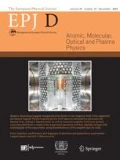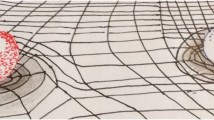Abstract:
The evolution of a quantum system under observation becomes retarded or even impeded. We review this “quantum Zeno effect” in the light of the criticism that has been raised upon a previous attempt to demonstrate it, of later reexaminations of both the projection postulate and the significance of the observations, and of the results of a recent experiment on an individual cold atom. Here, the micro-state of the quantum system gets unveiled with the observation, and the effect of measurement is no longer mixed up with dephasing the object's wave function by the reactive effect of the detection. A procedure is outlined that promises to provide, by observation, an upper limit for the delay of even an exponential decay.
Similar content being viewed by others
Author information
Authors and Affiliations
Additional information
Received 11 January 2001 and Received in final form 28 February 2001
Rights and permissions
About this article
Cite this article
Toschek, P., Wunderlich, C. What does an observed quantum system reveal to its observer?. Eur. Phys. J. D 14, 387–396 (2001). https://doi.org/10.1007/s100530170207
Issue Date:
DOI: https://doi.org/10.1007/s100530170207




